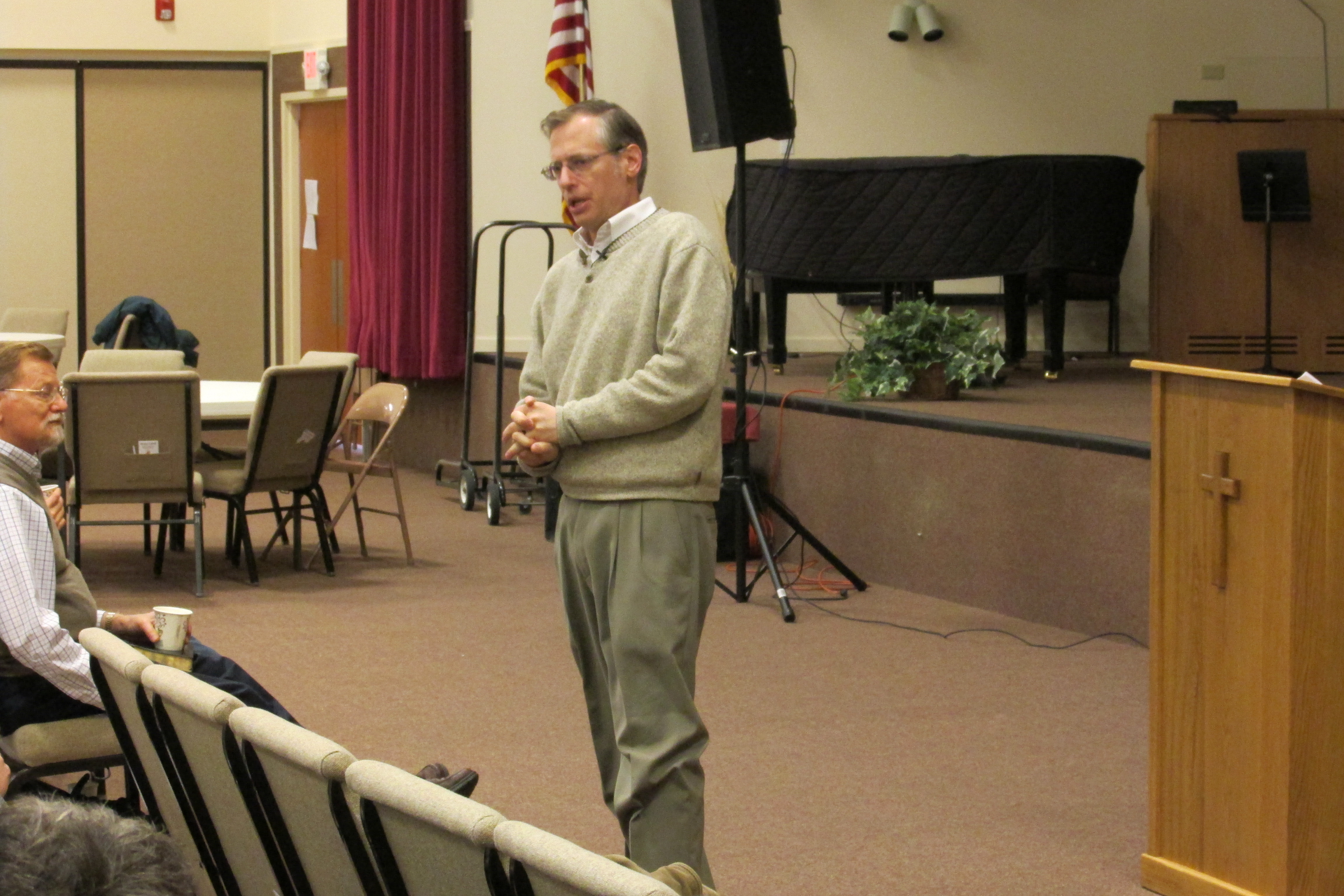Rev. Swanson’s second message was entitled Discipleship at Church. In order for a church to be healthy, closely-knit, and actively engaged in the Great Commission, there must be intentional discipleship taking place between the older, more mature members and the younger members.
Most American evangelical churches are lacking in discipleship simply because the staff is unable to handle the massive workload from the size of their church. This is an area where the smaller, family-integrated churches have a distinct advantage. The smaller congregation size is conducive to close relationships and a variety of opportunities to invest in each other’s lives.
While the father is the primary discipler of his family, it would be wrong to say that he and he alone can disciple his children. Christ Himself took James and John from their father, Zebedee. Church discipleship is complementary with home discipleship.
What was the school of Christ, in which the disciples were trained? “It was the school of old sandals and walking sticks, not pinstripe suits and airy lecture halls, more about the Kingdom of God than the empires than men, Old Testament law rather than Aristotelian ethics; discipleship rather than education.”
Rev. Swanson read I Thessalonians 2:11-12, which is a key text about what discipleship must look like in the church
“Just as you know how we were exhorting and encouraging and imploring each one of you as a father would his own children, so that you would walk in a manner worthy of the God whocalls you into His own kingdom and glory.”
While Paul was with the church at Thessalonica, he gave us an example of what purposeful discipleship in the church context should look like. He engaged in exhortation, encouragement, and entreating the believers to walk in a manner worthy of the God who had called them into His glorious Kingdom. This exhortation and encouragement was done in a familiar, intimate way; like a father instructing his children.
In order for there to be successful discipleship in a church, the members have to work hard to create a close-knit community. This may seem like a painfully obvious fact but, unfortunately, in many churches, deep and committed friendships are not as common as they should be.
Christ called His disciples His friends (John 15:14-15). You cannot disciple and mentor someone if you are not in a relationship with them. The problem is that our individualistic mindset predisposes us to throw up barriers which prevent the formation of close relationships. We are afraid to let our church family see how messy our everyday lives really are. And so, as a result, we content ourselves with shallow relationships. If you want to engage in purposeful discipleship with your church family, you have to open yourself up and love your brothers and sisters in Christ.
The Disciples were taught to apply what they had learned. Orthodoxy without orthopraxy is useless (James 1:22-23).
It is incredibly difficult to have a church where the members are exhorting and encouraging one another without having close relationships and a tight-knit covenant community. It is the responsibility of every member of the local church to be promoting an atmosphere of fellowship, encouragement, instruction, and support with the church community. It is also the responsibility of every church member to be dealing with conflict in a way that demonstrates Christian love. Inevitably, when sinful human beings enter into a relationship with one another, conflict is bound to happen. But this provides the church body an opportunity to practice love and patience with one another, thus becoming more conformed to the image of Christ and strengthening the relationships in the church.
“But encourage one another day after day, as long as it is still called ‘Today,’ so that none of you will be hardened by the deceitfulness of sin.” (Hebrews 3:13)
In order for the church in America to thrive and bear the fruit of intentional, Titus 2 discipleship, there must be a commitment among the church body to form a close covenant community, to bear one another’s burdens, and relate to one another in love. Without this commitment, the impact of the church upon the culture and upon the lives of its members will be reduced to irrelevancy. Christ said that the world would know that we were His disciples if we loved one another. Let us resolve to be the Church that disciples its members and demonstrates healthy relationships to a lost and lonely world.





 Covenant Family Church is a conservative, Bible-believing, and elder-governed congregation located in Wentzville, MO which seeks to evangelize the lost and equip those who have been converted to walk worthy of their calling in Christ.
Covenant Family Church is a conservative, Bible-believing, and elder-governed congregation located in Wentzville, MO which seeks to evangelize the lost and equip those who have been converted to walk worthy of their calling in Christ.  The Orthodox Presbyterian Church continues to be vigorous in its defense and propagation of the historic Christian faith, particularly as it was articulated by the Protestant Reformers of the 16-17th centuries.
The Orthodox Presbyterian Church continues to be vigorous in its defense and propagation of the historic Christian faith, particularly as it was articulated by the Protestant Reformers of the 16-17th centuries.  What led you to visit our website today? What are you seeking? Can we talk about that? Why don't you
What led you to visit our website today? What are you seeking? Can we talk about that? Why don't you  Seek the Lord while He may be found, call upon Him while He is near. Let the wicked forsake his way, and the unrighteous man his thoughts; let him return to the Lord, and He will have mercy on him...
Seek the Lord while He may be found, call upon Him while He is near. Let the wicked forsake his way, and the unrighteous man his thoughts; let him return to the Lord, and He will have mercy on him...